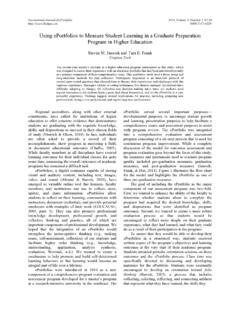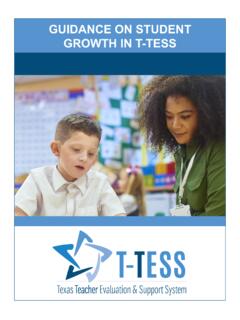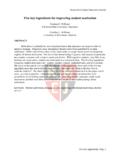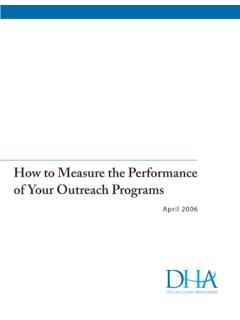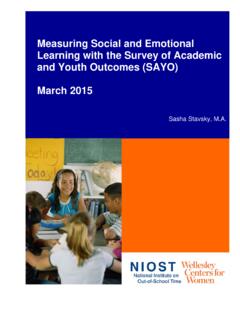Transcription of Student Engagement and Student Outcomes
1 Student Engagement and Student Outcomes :Key Findings from CCSSE Validation ResearchKay McClenney, C. Nathan Marti, and Courtney AdkinsCommunity colleges, known for their commitment to educating a diverse mix of students with widely varying needs, face greater demands than ever. Governing boards, state and federal governments, accrediting organiza-tions, and the public are looking beyond the enrollment numbers traditionally expected of these open-admission institutions they are demanding higher quality, better performance, and more accountability.
2 Community col-leges must respond by improving assessment and demon-strating improvements in Student learning and meet these higher expectations, community colleges cannot simply adopt data and tools from four-year insti-tutions. Community colleges need assessment tools and improvement strategies tailored to their unique strengths and challenges. The Community College Survey of Student Engagement (CCSSE) has been providing these tools since 2001. CCSSE s survey instrument, the Com-munity College Student Report, focuses on institutional practices and Student behaviors that promote Student Engagement .
3 With completion of the spring 2007 survey adminis-tration, CCSSE will have surveyed more than 700,000 students from about 550 different community colleges in 48 states, plus British Columbia, Palau, and the Mar-shall Islands. The findings from this validation research confirm that CCSSE results provide a valuable yardstick for assessing the quality of colleges educational practices and identifying ways they can produce more successful results more students across all subgroups learning at higher levels and attaining their academic Deta i l s a bou t t h e r e se a rch, v isi t w w c s se.
4 Org/pu bl ic at ions/pu bl ic at ions . findings from 20 years of research on undergraduate education have been unequivocal: The more actively engaged students are with college faculty and staff, with other students , and with the subject matter they study the more likely they are to learn, to stick with their studies, and to attain their academic goals. The existing literature, however, focuses almost exclusively on students in four-year colleges and universities. This special report provides summary highlights from a large-scale research project that examined, for the first time, relationships between Student Engagement and a variety of Student Outcomes including academic performance, persistence and attainment in community colleges.
5 The bottom line for community colleges: Student Engagement matters. The Community College Survey of Student Engagement (CCSSE) is built on the premise that Student Engagement involvement, integration, and quality of effort in social and academic collegiate experiences is significantly related to Student learning, persistence, and academic attainment. The connection between Student Engagement and Student success is grounded in decades of research. Thus, it makes sense that measures of Student Engagement may serve as a useful proxy for desired Outcomes of students collegiate CCSSE validation research confirms this premise by demonstrating a positive relationship between students self-reported Engagement behaviors (the data collected by CCSSE) and better Outcomes for community college students .
6 It shows that CCSSE is measuring institutional practices and Student behaviors that matter and there-fore, that the CCSSE survey instrument indeed provides a valuable proxy for Student success. The Research. The CCSSE validation research examines the relationship between CCSSE Engagement measures and easily verifiable outcome measures, such as course com-pletion, GPA, and graduation. These outcome measures, while ultimately more definitive than Student Engagement , become evident relatively late in students educational experiences.
7 In addition, these measures do not help col-leges assess their educational practices and pinpoint areas for improvement. A focus on Engagement , however, gives colleges systematic evidence that they can use to improve students educational experiences and thereby improve Student Outcomes . A three-pronged project, the research links responses to the CCSSE survey with three external, Student -level data sets that were established for the purposes of this project. They are: 1. The Florida community colleges;2. The CCSSE Hispanic Student Success Consortium (HSS); and 3.
8 24 of the 27 initial colleges participating in the national Achieving the Dream initiative. Know Thyself. In addition to validating the CCSSE survey, the linked studies contribute significantly to research in higher education. At most, 10% of all higher education research studies use community college samples. Given that deficiency, community colleges have had to rely on Student Engagement research primarily conducted on students attending baccalaureate-granting institutions. Limiting community colleges to this existing research restricts their ability to serve their students well.
9 The CCSSE validation study offers much-needed research con-ducted in community college Spice of Life. The research project s three-pronged approach addresses the great diversity in students served and programs offered by community colleges. Community colleges are diverse, in part, because their accessibility provides opportunity to low-income, first-generation, and academically underprepared students . Community colleg-es also serve older students who are pursuing training for current jobs or education to lead to better ones. They serve students who are squeezing in classes between multiple jobs and students who are on multi-institutional pathways.
10 Programs offered at community colleges reflect their stu-dents varied goals and conducted three separate validation studies to ex-amine a variety of questions across a diverse group of com-munity colleges. This approach allowed for comparisons and synthesis of results across the three studies and for identification of consistent findings. Because of the enor-mous variety in community colleges and the students they serve, it is to be expected that some environments foster certain types of Student Engagement and that some stu-dents experience greater impact than other students as the result of similar experiences.






